- Home
- Marsha Altman
The Ballad of Gregoire Darcy Page 2
The Ballad of Gregoire Darcy Read online
Page 2
“I am sure the abbey will reimburse you for the expense, Señor.”
“It is not just that. I will have to travel all the way to Oviedo for the wood, and I do not have the time or the money.You know the storm we had at the beginning of the spring? The very beginning? Right before the days of rain?”
“Yes.”
Señor Diaz seemed to be pleading with him. “They destroyed so many houses—I am so busy rebuilding them.”
“Business is good for you, then. I am sure the pews can wait. It is only a few that were damaged. Helping the people is more important.”
“Yes, but the people have no money to pay me, and I cannot work for free. I am the only carpenter here—I am exhausted. I do not know what I am going to do.”
“You say the families are in financial distress?” Grégoire said
“Yes—not for food but for stable roofs. Just yesterday, Señora Alvarado’s kitchen roof caved in. She was fortunate to be in the other room, or she might have been killed.”
“Why did you not inform the abbot? It is not fair for good people to be without shelter while we live in a castle.”
Diaz looked relieved. “I am glad you see it that way, but the abbey already feeds us—we cannot ask for more. I am sorry, but we have our pride.”
Grégoire nodded. “I see.” He put a hand gently on Diaz’s shoulder. “Trust in God, Señor. I assure you that you need not worry about the pews or acquiring the wood.”
“Thank you, Brother Grégoire.”
He bowed. “I have done little to earn your thanks. But now I must return for Compline. Go with God, Señor Diaz.”
“Go with God, Brother Gregory.”
He smiled and was on his way.Already a plan was forming in his mind, distracting him from his earlier conversation with the abbot. The families on the coast were in financial distress, but if the abbey gave them the money to rebuild, their pride would be injured. (And Grégoire knew enough about pride from his brother.)
But then there was his ten thousand pounds, most of which lay at his disposal for the year. The English pound was strong, and only a tiny fraction would cover all of their expenses in rebuilding their homes. The abbey did not know about it; Darcy had advised Grégoire to tell the abbey when he was in Bavaria and again before he had left for Spain. Grégoire had seen the wisdom in that. Besides, Benedictines, unlike his previous order, were not averse to dealing with wealth. The only matter was to contact his banker in Madrid and figure out a way to distribute the money anonymously, but by the time he returned to the abbey, he already had some idea of how to go about that.
Feeling considerably more settled, he sang with his brothers at Compline and was dismissed. It was eight, and in seven hours he would be woken for morning prayers and another day. He was hot and tired from the day’s work and the walk, and in the privacy of his cell, he removed his cowl and robe, and then painfully removed the vest beneath it. He cleaned away the blood—caked in some areas and wet in others—and then rubbed a lotion over his chest, where the damage from the cilicium—the hairshirt—was most severe. His back was too scarred from previous injuries to be much affected. After the soothing balm set in, he found an easy sleep. He was at peace with the world around him.
CHAPTER 2
Bride and Prejudice
“YOU SEE?” MAHMUD SAID as his servant fired the rifle, which emitted only a large sound and smoke but no bullet. “I cannot make it work. This it does, every time. I am afraid to do it myself. Nizam has burned his hands several times.”
Mahmud Ali Khan’s English was very good, and by now Charles Bingley and Brian Maddox were used to the local accent. Bingley’s trade with the East India Company in Calcutta was purchasing dye, but he was in talks to open a cotton plant. The company promised astronomical returns on such an investment, but Mahmud said he was hesitant to introduce a new crop to his extensive lands. Somehow Mahmud had obtained a Baker rifle from the local Sepoy Battalion—Indians employed as soldiers by the British—and was utterly fascinated by it.
“It’s the cartridge,” Charles Bingley said immediately. “Let me show you—when it cools down.”
Tea was brought for them, and the three men—the mogul lord, the fair-haired trader and the Englishman dressed in Japanese clothing—sat beneath a red umbrella. They looked out over their host’s gardens, all neatly arranged into rows of plants neither Bingley nor Brian could recognize, but which seemed more colorful than anything they had in England. Beyond them, not far north but out of their direct sight, lay the Ganges. They were trying to purchase tickets for a boat to Agra. Bingley was desperate to see the Taj Mahal, having heard its virtues extolled many times before he left England. Brian found himself in a more tentative position when exploring the Indian mainland. All of their stops so far—Bombay, Madras and Calcutta—had been coastal and sufficiently English. A thorough Orientalist himself, Brian had weighed his own interests against the fact that he had promised to deliver Bingley safely home. And Brian was not keen on committing seppuku because his cousin had drowned in the sacred river, or had gotten his head bitten off by a tiger, or had been knifed by an insulted shopkeeper because he had mispronounced something in Hindustani and insulted the shopkeeper’s daughter. The first threat had been on the boat itself, when Bingley’s fair skin had gotten sunburned quite badly in one afternoon. He had spent the rest of the trip wearing one of Brian’s bowl-shaped gasa hats, at the expense of Bingley’s dignity before the crew.
Bingley had done his best to prepare. Once he had secured his wife’s approval for the trip—which he had obtained at a cost he refused to mention—he went to Bath, where the legendary ex-Sepoy Dean Mahomet had a bathhouse. There, Bingley had spent many hours with the bathhouse owner attempting to pronounce languages he had only read in books and never heard spoken. He had also hired a drawing instructor. His penmanship was still hopeless, but to everyone’s surprise, he had turned out to be quite talented with a charcoal pencil when using his left hand, mainly because there was no ink involved. He was most dutiful about sketching all that he saw in India as he assumed that life would never bring him to these parts again.
Brian, who had already ridden their company’s boat once to the Orient with his wife a year earlier, focused on planning the route.They would be gone easily eight months, and the only communications possible would be from the Cape or Bombay back to England. He had never left his wife for that long in their entire marriage, but she had reassured him that keeping Bingley from getting himself killed was of paramount importance, and she would be fine. She was a samurai’s wife, so he had no doubt of it.
So far, no incidents had occurred on the trip that succeeded in taking either of their lives. That was why Brian had accepted the invitation from Mahmud Ali Khan to visit his palace beyond the boundaries of British Calcutta.
Now they sat on pillows as the gun cooled before Bingley. That gentleman, who was familiar with guns from his love of the sport of shooting, picked it up and demonstrated how to load the powder and the cartridge, just as the servant had done. “The key is to make sure the cartridge is all the way in. Sometimes you have to do this…”
He set the gun down, took the ramrod in both hands, and shoved it hard into the barrel.
“…to get in there.”
He removed the ramrod, brought the rifle to his right shoulder, and fired high into the sky.
“Perfect!” Mahmud clapped with delight. He stood up and clasped his hands together. “I am grateful to you, Mr. Bingali.”
“It’s no trouble,” Bingley said, handing the rifle back to him.
“No, let me invite you to my daughter’s wedding tonight. Surely you will come?”
Bingley cast a glance at Brian, sitting with one of his swords resting on his right shoulder. Brian nodded.
With his patented winning smile, Bingley said, “We’d love to come.”
The male crowd that gathered for the wedding of Mahmud’s second daughter (out of eight) were largely Muslim moguls, the earliest
arrivals arriving in time for evening prayer. The rest were a diverse group of people—Afghans, Hindu Brahmins, a few British officers from the nearest base, and higher-ranked local Bengal troops. The spoken language was mostly Persian, with a surprising amount of English, and, of course, Hindustani, Punjabi, Urdu, and some scattered Arabic—or at least what Bingley was fairly sure was Arabic.
Neither Brian nor Bingley had ever seen such a display of Oriental pageantry, and they had seen quite a bit of it in the past month. The houses and pavilions were adorned with green branches and bright orange flowers in an elaborate fashion. They passed rows of musicians, and lowered seats, and had been instructed not to speak to the people on the lowered seats beneath them. “Lower class” was a term taken quite literally in India.
The bridegroom was carried in on a palanquin, followed by a train of servants with lit torches, leading him from the house on one end that was his to the place where the bride sat, whom he had never met. Brian had to be careful not to lose Bingley in the crowd of overexcited people thronging to the raised semiana for the ceremony, though it was not terribly hard to keep track of a person with red hair in this particular crowd.
The music ceased as the mullah, the priest, entered. He read the wedding ceremony, rings were exchanged, and the couple joined by tying the ends of their shawls together. A glass of sugar water was passed to the bride and groom, and then around to the immediate audience of personal friends and family.
“Whatever you do, don’t draw this,” Brian said as the dancers entered. They wore embroidered silks and muslins. In some ways, their dress was flowing and modest, not like a tight bodice, but the way they moved did all of the work for them.
“Oh, I promise,” Bingley whispered back. Each man brought his palms together at his chest and bowed to the passing Mulna as he sprinkled perfumed water on them.
As the bride and groom were ushered away, the festivities truly began, complete with fireworks that put to shame any of the regent’s proud displays in Town. There was a man who seemed to swallow fire, but did not understand Bingley when he asked how he did it, the language barrier being too much or the entertainer not accustomed to being questioned.
The British were officers who had come because they never passed up a free meal. One of them, Kingston, was old and already retired from the military; he now worked as a translator. He claimed to have served under Wellington when he himself had been a colonel and Wellington a general. At that time, the gentleman who was now a duke had led the outnumbered British forces to storm the fortress of Gawilghur during the Anglo – Maratha War.
“He could inspire us to do anything,” said Kingston. “Even get ourselves killed. By God, he could do it with a single speech. I wonder whatever became of that man?”
Brian and Bingley shared a laugh as another guest showed them the correct way to smoke a hookah, not like “you bloody foreigners”—hold the pipe just right and do not exhale until the precise moment. They watched the man in a turban bigger than his head puff smoke in rings and were entranced. The mild buzz of tobacco was the only intoxicant there, because their host was religious and did not serve spirits. Instead, there were trays and trays of sweet cakes, bananas, fruits, and bread with honey.
“I would still give anything for a good plate of ribs,” Brian said in Japanese. Bingley understood the language adequately, thanks to three months of education on the boat, and they used it when they wanted to talk privately.
“I thought you were an Oriental,” Bingley said. Brian had not brought a single piece of English clothing in his trunks.
“An Oriental who would go for a cow right now,” he replied. “But don’t translate that to this guy,” he said as a man in Hindu dress sat down. He had a bright red turban and a red dot on his head. He spoke only Hindi.
“‘The eye that spies,’” Bingley translated for Brian. “I think.”
“You mean ‘all-seeing.’”
“Maybe I do,” Bingley said, and then returned to his conversation with Shalok. “What? Yes, I have daughters—well, one of them is, the other is blonde, No, I will not sell the red-haired one! What, 5,000 rupees? No sale. Understand? No sale! Not selling!”
What Brian understood made him fall over sideways with laughter.
“When did I become the responsible one?” Brian said when they finally made it back to their guest house. It was now well into the morning, and the muezzins were already making their calls for prayer. Prayer is better than sleep! God is great!
“Compared with that, my wedding was positively dull for the guests,” a sleepy-eyed but still hyperactive Bingley said. He had eaten a great deal of sugar that night, so he was still quite awake. He washed his face in the washbasin, scraping off the red body paint on his forehead. “It was fine for me—I honestly don’t remember a thing.”
“I remember not understanding anything,” Brian said, removing his swords and carefully setting them on the cushions. “It was all in Russian, I think. Papist ceremony. And I thought, What I would give to have Danny see me here—wearing a crown and marrying a princess.”
Bingley lay down on his own bed. He was wearing an orange silk kurta that he used for both sleep and activity, something he found very convenient. “Darcy was at my wedding, but I don’t think he was particularly paying attention to me.” He sighed in exhaustion. “Maybe we should do something with flowers and fireeaters for my daughters instead of a vicar going on and on about marriage and sin.”
“I’m sure Mrs. Bingley will take well to that.” Brian disappeared behind his screen and removed his hakama, letting his robe fall down. “And where are you going to get all those tiny flowers?”
“I suppose we’ll have to start growing them when we get back. In ten years, they might be ready.”
“Ten years?”
“Something tells me Georgie isn’t going to be begging me to go out, much less be eager to marry. Eliza, I don’t know, but she’s only ten, thank goodness.” He paused. “May I ask you a personal question?”
“You may.”
“How old is Her Highness?”
“Four and twenty.”
Bingley put a hand on his head. It was too early in the morning to be doing these calculations. “So when you were married her, she was—”
“Young, yes. Certainly not anything objectionable, but I am nearly two decades her senior.” He sighed. “I’ve never been good at planning. In fact, I think my entire life has been one happenstance after another.”
“Turned out fairly well anyway.”
“Still. It would not have been the safest bet. But then again, I was never any good at betting, which was what got me in trouble in the first place.”
Bingley laughed. “You should become a Muslim, then. They forbid gambling, so you wouldn’t be tempted.”
“And spirits. No, I would not survive long without a good shot of whiskey, or maybe gin, or beer. I won’t be sitting at the dinner table, drinking milk. Like a child.”
“I like milk.”
“My point exactly.”
CHAPTER 3
To the Ends of the Earth
ALTHOUGH ELIZABETH DARCY privately held the opinion that her children had been the most beautiful babies in the world, she said otherwise as this particular newborn flailed his tiny limbs around. “He is the most adorable boy I’ve ever seen.” And Viscount Robert Kincaid was indeed a little treasure, still rather pink and often refusing to open his eyes. His hair—what little of it there was—was brown, like his father’s.
Lady Georgiana Kincaid (née Darcy) beamed with motherly pride, as could only be expected, and well deserved after the nerveracking and life-threatening experience that was labor. Despite everyone’s fears, all went well, and Baby Kincaid came into the world after just six hours of labor. Within only four days, Georgiana was well enough to stand at the christening, with her brother and sister as godparents.
The Darcys had arrived in the last weeks of Georgiana’s confinement, children and all. The mansion was not
how Elizabeth remembered it—it had been renovated to be more livable, but you could make a castle only so modern. Lord Kincaid was in fine form. He was good at hiding his nerves, expressing them mainly in fencing with Darcy and Geoffrey. The latter had recently been allowed to take up the sport and seemed to relish it with his father’s old enthusiasm. Between Darcy having to fight on his weak side and Geoffrey’s age and inexperience, Kincaid easily bested them both, but was good enough to make it not seem as such. Darcy was not so much determined to see his son a fighter as he was to see the future master of Pemberley engage in all forms of masculine activity, and not be overwhelmed by the influence of three younger sisters. Fitzwilliam Darcy loved all of his children as much as a father possibly could, but there were moments when they were all in a room together that he felt he could sympathize with Mr. Bennet. And his daughters weren’t even near puberty yet. He didn’t wish to imagine it.
Darcy had worried obsessively about Georgiana’s state during her entire pregnancy. He had been relieved that she did not conceive during the first few years of marriage, and the earl did not seem to mind in the least. When she did conceive, she was five and twenty, and it was obvious that she was ready, physically and emotionally. Still, during her labor, he had to steel himself with a full glass of whiskey. Their mother had died giving birth to her. He had little memory of the labor—it was a woman’s thing—and had been thoroughly confused by this small thing that was supposed to be his sister, though where in the world she had come from, the young Master Fitzwilliam could not tell and no one had enlightened him. But when his mother had taken ill the next day, he noticed. He would have stayed with her, but they mostly kept him out of her room. He saw her only twice before her death two days later. He had lost his mother and was left with this tiny thing that made noises but did not seem as though it would ever be a person. It was not a fair trade. Only his father could assure him that some good had come of it, and as Georgiana grew to be his darling sister, he came to believe him.

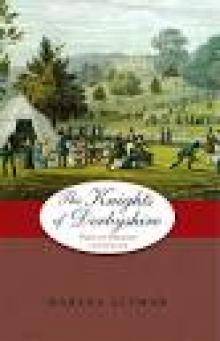 The Knights of Derbyshire
The Knights of Derbyshire Other Tales: Stories from The Ballad of Gregoire Darcy
Other Tales: Stories from The Ballad of Gregoire Darcy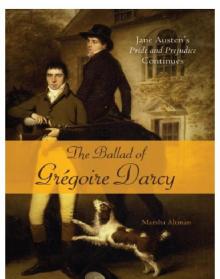 The Ballad of Gregoire Darcy
The Ballad of Gregoire Darcy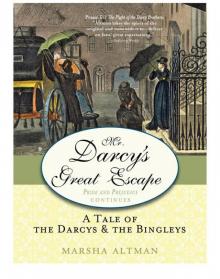 Mr. Darcy's Great Escape
Mr. Darcy's Great Escape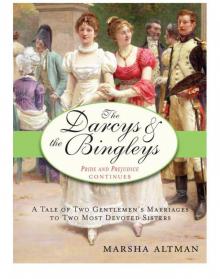 The Darcys and the Bingleys
The Darcys and the Bingleys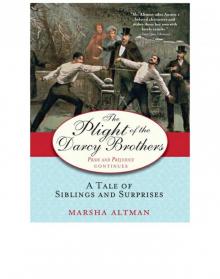 The Plight of the Darcy Brothers
The Plight of the Darcy Brothers The Road to Pemberley
The Road to Pemberley